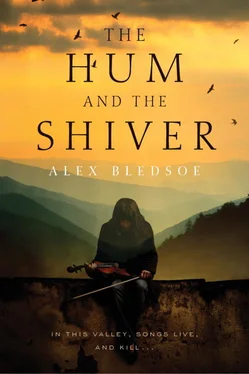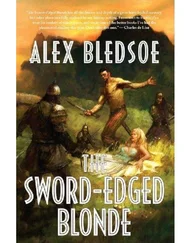She nodded. She could still smell both the gasoline from the wrecked truck and the burning flesh of the man trapped behind her. “One of the Iraqis was trying to get me out of the truck.”
Deacon’s voice changed very slightly, but it was enough to express his sincere, extreme concern. “You sure it was a real thing, and not just something you imagined?”
“No,” she said bitterly. “I’m not sure. You hear about something enough, your brain starts to believe it. The whole time I was in the hospital, I heard about how the Iraqis pulled me out of the wreck and then… well… did stuff to me.” She actually blushed, something she hadn’t done in years, at talking about this in front of her parents. “But I don’t know if it’s true.”
“There’s ways to find out,” Chloe said quietly. “If it matters.”
“No,” Bronwyn said. “It doesn’t, really. I’ve got enough pain that I can remember.” She shifted her weight, wishing she’d brought a pillow to put beneath her butt on the hard chair.
Aiden finally emerged from his bedroom. “Did I hear a gunshot?”
“Your mama was just making a point,” Deacon said, his gaze on Chloe. He kissed her on the cheek and went outside. Chloe turned on the water and began washing the breakfast dishes. She kept her back to her children.
Aiden leaned close to Bronwyn and said, “I hear you’ve got a haint.”
“You hear a lot,” she said. For just a moment, her old big-sister annoyance with Aiden threatened to appear, but it faded. Would she be numb this way forever?
“Well, if you want, I can sit up with you and run it off when it shows up again.”
She snorted. “You’d pee your pants if you saw a ghost. You know you would.”
“Uh-uh. I’d look it right in the eye and say, ‘Hey, leave my sister alone, she’s a war hero.’ Then I’d chase it with a hatchet.”
“What if it didn’t have any eyes? What if it just had big black sockets where its eyes used to be?”
He thought this over. In utter deadpan he said, “Then instead of a hatchet, I’d use a socket wrench.”
They both burst into giggles. Without turning Chloe said, “Aiden Hyatt, get down to the bus stop now. Nobody’s got time to drive you in to school if you miss it.”
“Yes, ma’am,” he said with a full-body shrug. He grabbed his book bag and dragged it across the floor behind him as he slouched out the door.
As Bronwyn watched her brother leave, something swaying in the breeze caught her eye. Through the screen door she saw a bundle of feathers tied together with hexwound guitar string and hung from a wind chime’s clapper, giving extra purchase to the wind and producing a constant, soft tinkling.
She frowned. She knew what this was… didn’t she? The hawk feathers, mixed with those of a crow and tied to the clapper between three chimes that, in the right order, played… what song? What did it mean?
Her father must’ve built it; he loved putting chimes together in different musical combinations, and had racks of aluminum and wooden tubes in the shed. But she wouldn’t ask him, because goddammit, she should know. She was a Tufa, a First Daughter, heir to the songs and rider on the night wind.
At last she said, “I think I’m going to lay down for a while. I’ll see you at lunch.”
* * *
In her room, she once again opened the mandolin case. The instrument gleamed in the sun coming through the window; its finish reflected the red, white, and blue from the curtains. She rested her fingertips lightly on the strings.
The calluses she’d earned had softened a little in the time she’d been away, but her skin still seemed to hold the memory. Her thumb curled as it would to pluck a string. But the experiences that connected these things, that allowed her to coax music from Magda, were still missing.
Because of her sudden media notoriety, the military doctor who’d tended her when she arrived stateside from Iraq had tried to be kind, but clearly lacked experience in real doctor–patient relations. “You may have some memory loss. Most of it will be connected directly with the accident, when your brain suffered its trauma. But it could crop up with other things. You may forget people you’ve known all your life, how to do certain tasks, and so forth. You can relearn the skills; the memories may or may not return.”
Since she’d been semiconscious with a feeding tube down her throat, she’d only been able to nod. Really, though, what other response could there be?
She turned the mandolin in her hands. It was light, and felt fragile compared to the heavy, solid things she’d handled for the past two years. She had refused to take it with her to basic training, and from there to her deployment in Iraq, because she wanted nothing to remind her of Needsville. But now it was more tangible than the metal guns, equipment, and vehicles she’d gotten to know intimately.
“Shit,” she sighed, and felt her eyes itch as tears tried to form. But like her memories, they never quite appeared.
Don Swayback sat down at his mother’s kitchen table. He used to think of it as his table, too, but since he’d grown up, he had a hard time feeling connected to this old house, these old things, even this old woman now settling into her own seat across from him. Even the town, Rossell, had grown and expanded until it was unfamiliar and alien.
“It’s good to see you, son,” his mother said. Her name was Gloriana, although everyone called her Glory. “And it’s not even Mother’s Day. Shouldn’t you be at work? You didn’t get fired, did you?”
“You know, if you keep picking on me, I’ll stop coming at all,” he teased.
“Then I wouldn’t have to do dishes more than once a month,” she shot back. She was eighty-two, still self-sufficient except for the twice-weekly cleaning woman.
Don sipped his coffee and buttered a biscuit. “Mom, can I ask you something? Which side of the family has the Tufa in it, yours or Dad’s?”
Glory’s eyebrows rose in surprise. “Lord, son, why are you asking something like that?”
“I have to get an interview with Bronwyn Hyatt.”
“Who?”
“You know, that girl from over in Needsville who was captured by the Iraqis? Got rescued on live TV?”
“Oh, I sure remember that. They played it enough on the news. Well, now, that’s just something,” Glory said with a shake of her head. “Hasn’t she been talked to enough?”
“That’s just it,” Don said as he added homemade pear reserves atop the butter. “She’s been talked about, but not to. No one’s really had an in-depth interview with her about what it was like to be a Needsville Tufa so far from home.”
“And that carpetbagger you work for wants you to do it?”
He nodded. “The Tufas don’t cotton to outsiders, so I figure the best way would be to go through family. I know we’re related to some Tufas somehow, but I don’t know the particulars.”
“Well, what makes you think I do? We don’t associate with that Needsville trash, never have.”
“Then where’d I get this?” Don said, and tugged on a lock of his black hair.
Glory sighed. “If you must know, son, it’s through your late daddy’s side of the family. The Swaybacks mixed with the Tufas when your great-granddaddy Forrest married a Tufa widow woman named Benji. I can’t remember what that was short for. They met working on one of them Roosevelt WPA projects during the Depression. Something about ‘documenting the rural lifestyle,’ or some such nonsense.” Her disdain for Roosevelt, Democrats in general, and the Tufa all combined to give her words a sour, bitter flavor.
Читать дальше












